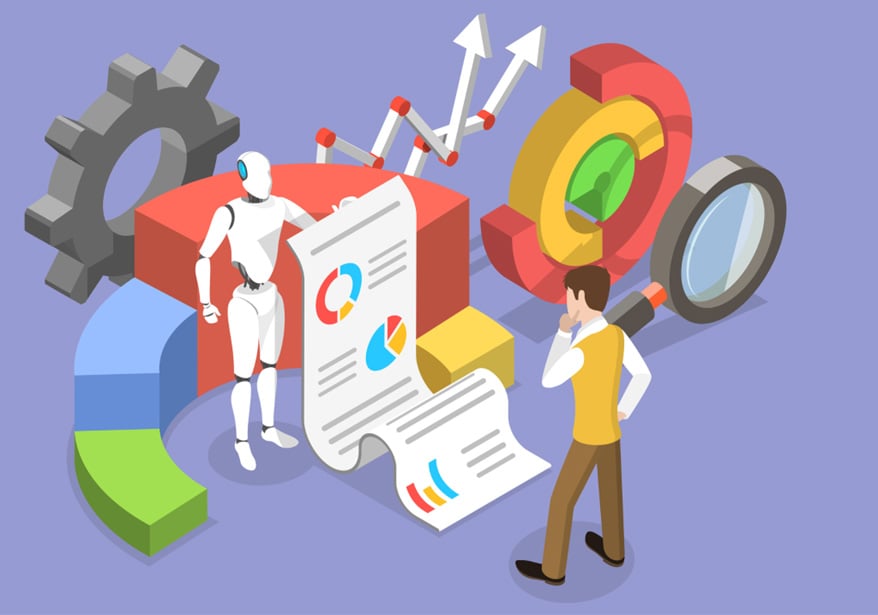Written by Sean McPheat | 

Artificial Intelligence (AI) tools for sales are revolutionising the way companies approach their sales strategies, offering smarter, faster, and more effective solutions.
In this blog, we’ll explore how these tools not only enhance sales training but also provide comprehensive AI sales solutions that can transform everyday operations. You’ll learn how to use AI for sales, integrating advanced technologies to streamline processes and increase productivity.
Whether you’re new to AI or looking to refine your strategy, this guide will equip you with the knowledge to leverage AI effectively in your sales efforts!

AI is transforming sales processes by automating tasks, analysing vast amounts of data, and providing insights that were previously impossible to obtain.
What is AI in the context of sales?
Put simply, AI systems employ complex pattern recognition and prediction algorithms to spot trends and signals in the data that no human would be able to detect.
This ability allows these AI-powered tools to predict customer behaviour, personalise interactions, and enhance decision-making, leading to more efficient and effective sales strategies.
AI can’t replace the human touch in closing a sale, but it can give you the edge when you’re researching leads, planning a strategy, or marketing your services.
Next, let’s look more closely into how AI can help you become a better seller.
AI integrates seamlessly into both sales and marketing, streamlining efforts and increasing efficiency. That’s because both sales and marketing are data-driven activities, where the more you know your potential audience and its behaviour, the better you can meet their needs.
That last element (delivering what the customer needs) is key.
Says Rob Garf, VP, and general manager at Salesforce, “The future of sales is to serve, not sell. Generative AI gives us guidance that’s so personal and precise, we’re always presenting the most relevant solutions — no pushing required.”
In sales, AI can automate numerous functions including:
In marketing, AI tools can assist in a range of activities including:
What all these functions have in common is the need to analyse copious quantities of data, recognise behavioural patterns and shape sales or marketing responses accordingly.
Put simply, AI is excellent at all of the above.
A recent paper published in the International Journal of Intelligent Networks (Artificial intelligence (AI) applications for marketing: A literature-based study) had this to say:
“Analysing data is the most critical advantage of AI in marketing. This technology will analyse massive amounts of data and provide marketers with real-world and actionable insights.”

AI is a multipurpose tool. It can fulfil a range of functions within sales and marketing and thus has been incorporated into all manner of digital solutions.
Here we will break them down into seven categories and provide two to four examples for each type of tool.
CRM systems like Salesforce and HubSpot incorporate AI to provide predictive analytics, automate routine tasks, and personalise customer interactions.
Salesforce: The leading sales platform has a dedicated suite of AI tools, Einstein 1, which can analyse data from internal and external sources to provide insights and recommendations. It can automate email writing, identify trends, and even analyse videos and image content.
HubSpot: The other giant of sales CRM software provides several AI-powered tools including a content assistant, an SEO recommendation engine, and AI summarisation. Most of its current AI functions are centred on content marketing and social media, but they have big plans, as laid out in their AI roadmap.
Zoho CRM: The age of AI assistants is here. Zia is Zoho’s sales assistant, designed to fetch data, help you organise your notes and automate everyday tasks. She’ll also help with email writing and sales predictions.
Pipedrive: Pipedrive offers its own AI-enabled personal assistant, powered by OpenAI, the creators of Chat-GPT. Although it hasn’t given the AI a snappy name, it aims to assist with email creation, marketplace searches, and other automatable tasks. A 14-day free trial is available.
Need a hand picking a CRM system? Check out our blog post on Salesforce Alternatives & Competitors
Tools like Gong and Clari use AI to analyse sales calls, emails, and meetings, providing insights into sales performance and customer behaviour.
Gong: Claiming to increase win rates by up to 50%, Gong.io describes itself as an “all-in-one revenue intelligence platform.” It specialises in sales forecasting and engagement and offers an overview of every customer touchpoint, to help sales staff improve their game.
Clari: This unified platform for sales analytics claims to reduce lost deals by 10% and increase win rates by 24% via its RevAI app. It’s very much aimed at enterprise-level businesses and includes conversation intelligence, the ability to analyse sales calls and generate sales coaching tips to improve rep performance.
InsightSquared: This platform, aimed at SMBs, has an AI-powered sales forecasting function, using machine learning-derived metrics like “confidence to close” and “ideal customer profile” to help direct rep energy and effort where it’s most useful.
AI chatbots like Drift and Intercom engage with customers in real-time, answering queries, and guiding them through the sales funnel.
Drift: This describes itself as a “buyer engagement platform” and listens to your conversations to help shape more convincing pitches and better personalisation.
Intercom: Intercom prioritises customer service, since reducing churn and upselling are both vital elements of sales. It provides more than a chatbot, being a support agent, an assistant, and an insights platform all-in-one.
Tools such as InsideSales and Leadspace utilise AI to score leads based on their likelihood to convert, helping sales teams prioritise their efforts.
InsideSales: Inside Sales is great at helping you build sales playbooks tailored for maximum success, using data to back-up your reps’ experience and gut instincts. It includes “neuralytics,” the art of knowing when and how to connect with each lead.
LeadSpace: This tool specialises in gathering market data to help you segment leads and prioritise your approaches. It connects to your CRM to graph your leads and draws from over 30 B2B sources and more than 700 million contacts.
For more information on Predictive Analytics check out this blog post: The Power Of Sales Forecasting And Predictive Analytics
AI-driven platforms like Overloop and Outreach automate sales workflows, ensuring that sales representatives can focus on high-value activities.
Overloop: Formerly called Prospect.io, Overloop automates the sales funnel by importing LinkedIn and other prospect details and generating effective email campaigns.
Outreach: Describing itself as a sales execution platform, Outreach helps automate all stages of the sales pipeline, from account-based sales and prospecting through to closing and retention. It even has features for recruitment professionals.
Personalisation Engines
AI personalisation tools like Dynamic Yield and Smartech tailor marketing messages and sales pitches to individual customers, enhancing engagement and conversion rates.
Dynamic Yield: Hyper-personalisation is the buzzword of the moment, and this tool includes something called Experience OS that optimises everything for individual recipients, including emails, push notifications, app UX, web content and more.
Smartech: One of the market leaders in omnichannel personalisation, Smartech has been folded into Netcore’s customer engagement platform to create customised landing pages, product listings, recommendations and more. With Smartech, literally every site visitor will see a uniquely curated landing page.
Natural Language Processing (NLP) Tools
NLP tools like Conversica and Crystal analyse customer communications to provide insights and recommend the best ways to respond.
Conversica: This generative AI platform uses several LLMs to mimic a real human personality in a natural, responsive, and personalised manner.
Crystal: Describing itself as a “personality data platform”, Crystal helps you dig deep into the characters of your interlocutors before you meet, ensuring you adopt the right approach. It applies psychology and data analytics to help you forge those vital connections.
Chat-GPT 4o: Even in its naked, non-specific form Chat-GPT can provide tailored content and responses to an infinity of prompts, including mimicking style and tone, and formatting its content just the way you need it. However, OpenAI now offers a range of tailored AIs, including “humanizers” and a data analyst.

Implementing AI tools effectively in sales strategies involves several practical steps:
Several AI solutions integrate smoothly with existing sales platforms to optimise processes.
For instance, Salesforce Einstein and Microsoft Dynamics 365 offer integrated AI capabilities that enhance CRM functionalities without requiring significant changes to existing workflows.
Sugar is a new AI-driven CRM, using AI’s data wrangling power to automate and assist multiple departments, from sales and marketing to customer support.
Such solutions provide real-time insights, predictive analytics, and automation features that drive AI sales enablement and efficiency.
Crucially, they don’t require you to create an API connection between platforms which may or may not communicate well.
Generative AI, which involves AI systems that can create content, is changing the sales landscape.
Tools like OpenAI’s GPT-4 can generate personalised emails, proposals, and content at scale, allowing sales teams to focus on building relationships and closing deals.
This and similar LLMs have been installed within many sales platforms and CRMs. In fact, platforms that don’t include some form of AI-powered data analytics or content generation are becoming a rarity, for good reason.
Generative AI technology enhances creativity, reduces workload, and ensures a consistent and high-quality customer experience. What it doesn’t do is replace the individualized touch and human interaction of sales reps
Says Cory Benz, Revenue Operations Manager at Crexi, “Sales AI is making it easier and better to work, but not by taking jobs from sales reps. Deals are won by having a conversation, and I think you’re always going to need a person to have that relationship and build that rapport with the customer. What we want to do is leverage AI so that they can do more of that.”

IBM Watson’s AI capabilities have significantly enhanced sales for companies like Vodafone.
By integrating AI in sales and marketing, Vodafone uses Watson to analyse customer data and predict trends, resulting in a 20% increase in customer satisfaction and a 40% reduction in churn rates.
Watson’s AI sales optimization enables personalised customer interactions and effective sales strategies.
Sephora leverages AI tools for sales through its Virtual Artist tool, which uses AI to provide personalised product recommendations and virtual try-ons.
This seamless AI sales solution has led to a 30% increase in online sales and improved customer engagement.
By understanding how to use AI to increase sales, Sephora has transformed its customer experience and streamlined its sales processes.
Tesco has implemented AI sales tools to enhance its customer experience and sales performance.
By using AI-driven recommendation engines and personalisation algorithms, Tesco has seen a 25% increase in online sales. It has begun to use AI to create location-specific product ranges for its Express stores.
Tesco’s AI system analyses customers’ online purchase history and preferences, then offers personalised promotions and product suggestions. This seamless AI sales solution has not only boosted sales but also improved customer loyalty and satisfaction.
BT Group uses AI for sales enablement to streamline its sales processes and improve customer interactions.
By integrating AI-powered chatbots and virtual assistants, BT Group has achieved a 35% increase in lead conversion rates. These AI tools for sales handle routine inquiries, allowing sales teams to focus on high-value tasks.
Additionally, AI-driven predictive analytics has helped BT Group forecast sales trends and optimise their sales strategies, resulting in a 20% increase in overall sales performance.

While AI offers numerous benefits for sales teams, it is essential to approach its implementation and use with caution.
Missteps in adopting AI can lead to inefficiencies, ethical issues, and unintended negative consequences.
Here are some potential downsides and ways in which a sales team might misuse or fail to benefit from AI:
Loss of Personal Touch: AI tools can automate many aspects of sales, but over-reliance on automation can lead to a lack of personal interaction with customers. Sales is fundamentally a relationship-driven field, and excessive automation can make customers feel undervalued and disengaged.
Reduced Critical Thinking: When sales teams overly depend on AI recommendations, they might neglect their own critical thinking and intuition. This can result in missed opportunities that a more nuanced, human approach could capture.
Mishandling Sensitive Data: AI systems often require substantial amounts of data to function effectively. If not managed properly, this can lead to data breaches or misuse of sensitive customer information, damaging the company’s reputation and customer trust.
Compliance Issues: Different regions have varying regulations regarding data privacy (e.g., GDPR in Europe). Failing to comply with these regulations when using AI can result in legal repercussions and hefty fines.
Embedded Bias: AI systems are only as good as the data they are trained on. If the training data contains biases, the AI can perpetuate or even amplify these biases in its predictions and recommendations, leading to unfair treatment of certain customer segments.
Unintended Discrimination: Bias in AI can also lead to discriminatory practices, such as unfair pricing or targeted marketing that excludes certain groups. This not only harms those groups but can also attract regulatory scrutiny and damage brand reputation.
Ignoring Context: AI provides data-driven insights, but these insights need to be interpreted within the context of the specific business environment. Without proper context, AI recommendations might lead to misguided strategies.
Overestimating Accuracy: Sales teams might place undue confidence in AI predictions without recognizing the limitations and uncertainties inherent in AI models. Overestimating the accuracy of AI can lead to poor decision-making.
High Initial Costs: Implementing AI solutions can be expensive and resource intensive. Smaller sales teams might struggle with the initial investment required for AI tools and technology.
Integration Issues: Seamless AI sales solutions need to be properly integrated with existing systems. Poor integration can lead to data silos, workflow disruptions, and decreased overall efficiency.
Employee Pushback: Sales teams may resist adopting AI tools due to concerns about being made redundant or a reluctance to change established ways of working. Without proper training and change management, the adoption of AI can be met with resistance and underuse.
Lack of Training: Insufficient training on how to use AI tools effectively can result in misuse or lack of understanding. Sales teams need comprehensive training to grasp the capabilities and limitations of AI, as well as how to interpret its outputs correctly.
While AI holds exciting potential for transforming sales strategies, it is essential to approach its implementation thoughtfully.
By being aware of these potential downsides and proactively addressing them, sales teams can maximise the benefits of AI while mitigating the risks.
A balanced approach ensures that AI serves as a powerful tool for enhancing sales performance rather than a source of unforeseen challenges.

The future of AI in sales promises even more advanced capabilities. Here are three brief predictions for how AI will continue to revolutionise sales in the coming years:
AI is transforming the sales landscape by automating tasks, providing deep insights, and personalising customer interactions.
By adopting AI tools for sales, sales teams can enhance their performance, streamline processes, and achieve better results. To stay competitive, it is essential to embrace these technologies and continuously refine your AI strategy.
Explore our Sales Training Courses to upskill your team or consider our Sales Management Training for comprehensive sales team leadership development.
Assess your team’s strengths with our sales assessment tools, including a Sales Personality Test and our Sales Competency Assessment, to ensure they are well-equipped for success in an AI-driven sales environment.

Sean McPheat
Managing Director
MTD Sales Training
Updated on: 19 June, 2024
Related Articles

Search For More
